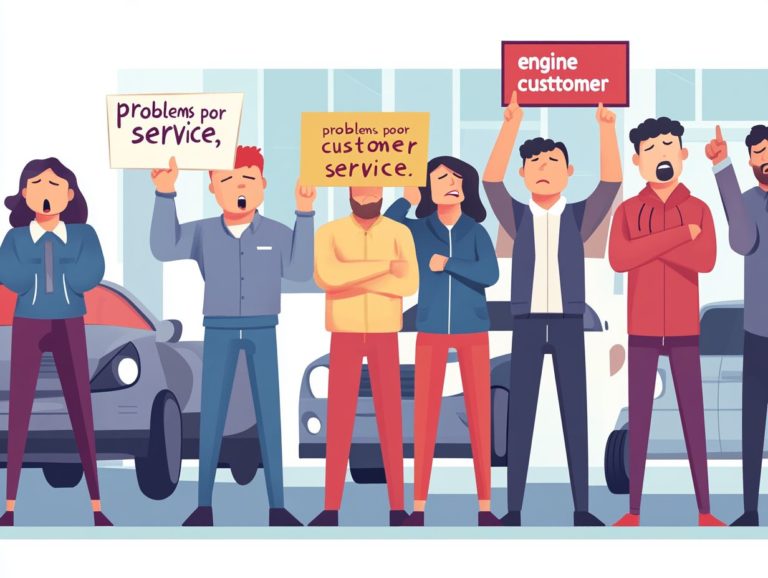10 Essential Criteria for Car Comparisons
Choosing the right car can feel overwhelming given the multitude of options at your disposal.
Understanding the key factors that influence your decision is crucial for arriving at a choice that aligns seamlessly with your lifestyle and budget.
Explore ten essential criteria during your car comparisons, ranging from price and fuel efficiency to safety features and brand reputation.
Whether you’re a first-time buyer or ready to upgrade, these insights will guide you toward a choice that perfectly fits your needs.
Contents
- Key Takeaways:
- 1. Price and Affordability
- 2. Fuel Efficiency
- 3. Performance and Handling
- 4. Safety Features
- 5. Interior Space and Comfort
- 6. Technology and Connectivity
- 7. Maintenance and Repair Costs
- 8. Resale Value
- 9. Environmental Impact
- 10. Brand Reputation
- What Are the Key Factors to Consider When Comparing Cars?
- What Are the Most Important Features to Look for in a Car?
- What Are the Most Common Mistakes People Make When Comparing Cars?
- How Can One Ensure an Accurate and Fair Comparison?
- What Are the Benefits of Using Online Tools for Car Comparisons?
- Frequently Asked Questions
- Price Comparison in Car Buying
- Safety Considerations in Car Comparisons
- Fuel Efficiency’s Role in Car Comparisons
- Performance and Its Impact on Car Choices
- Feature Comparison for Car Selection
Key Takeaways:
- Price and affordability are key factors in car comparisons. Set a budget beforehand.
- Consider fuel efficiency and performance to save money on gas over time.
- Evaluate safety features, interior space, technology, maintenance costs, resale value, environmental impact, and brand reputation.
1. Price and Affordability
When choosing a new car, price and affordability are paramount. Evaluate your financial situation alongside various car models to find the perfect vehicle that meets your needs without stretching your budget.
Assess ownership costs, including insurance, maintenance, fuel, and potential repairs over time.
Explore financing options that can significantly impact your budget. Understand interest rates and terms for loans and leases to make an informed decision.
Check trade-in values to reduce the overall amount you need to finance. Compare prices from different dealers, as there can be considerable variations.
Gain insights into the current market for new cars, including promotions and manufacturer incentives, to negotiate better deals and maximize your investment.
2. Fuel Efficiency
Fuel efficiency is a vital consideration when selecting your next vehicle. It impacts both the environment and your savings on gas over time.
The type of engine in a car significantly influences its fuel efficiency. Hybrids and electric vehicles often outperform traditional gasoline engines. For example, hybrids can achieve around 50 miles per gallon, while fully electric vehicles eliminate fuel costs, presenting a sustainable alternative.
Specifications such as car weight, shape, and tire type also play a crucial role in determining a vehicle’s mileage. Recent rankings spotlight models like the Toyota Prius and Tesla Model 3 as leaders in fuel efficiency, showing that prioritizing fuel efficiency can reduce ownership costs and contribute positively to the environment.
3. Performance and Handling
The performance and handling of a new car shape your driving experience. Satisfaction and enjoyment on the road depend on factors like vehicle performance and its alignment with your driving style.
To assess performance metrics like acceleration, braking, and cornering ability, automotive experts conduct thorough tests under various conditions. They clock 0 to 60 mph times to see how quickly models respond to throttle input, while measuring braking distances for safety and control.
Cornering tests reveal how effectively a car maintains stability and grip during turns, underscoring the significance of suspension design and tire selection. Comparing sports cars with sedans, lightweight materials in high-performance models enhance agility for a more exhilarating drive.
Features like adaptive suspension and traction control enhance the driving experience.
4. Safety Features
Safety features are fundamental to your new car purchase, enhancing your driving experience and contributing to higher safety ratings and positive consumer reviews regarding reliability.
Today’s advanced safety technologies affect buying choices. Features like automatic emergency braking, lane-keeping assistance, and adaptive cruise control are now standard in many models, highlighting their importance for manufacturers and consumers alike.
Institutions like the National Highway Traffic Safety Administration (NHTSA) and the Insurance Institute for Highway Safety (IIHS) evaluate these advancements through crash tests. Their ratings guide your choices and motivate manufacturers to prioritize safety.
Consumer feedback sheds light on how well these features work in real life, providing a comprehensive view of how vehicles safeguard their occupants.
5. Interior Space and Comfort
Interior space and comfort should be at the top of your list when choosing a new car, especially for families needing cargo space and seating.
A spacious interior makes long drives enjoyable, providing enough legroom and headspace for comfort—no one enjoys feeling cramped.
Consider the Honda Odyssey and Kia Carnival for their flexible seating, easily transitioning from family transport to hauling equipment.
If cargo space matters, check out the Subaru Outback and Toyota RAV4, known for their generous trunk areas that adapt beautifully for family outings or road trips. Understanding how these models cater to family needs ensures every journey is enjoyable and practical.
6. Technology and Connectivity
Technology and connectivity enhance your driving experience. Features like automatic systems and advanced infotainment options are essential for today’s car buyers.
Most cars now allow easy smartphone integration, giving access to navigation, music, and messaging apps through intuitive interfaces. Voice control has transformed vehicle interaction, enabling hands-free commands for safety and convenience. Reviews praise these systems for user-friendliness.
Responsive touchscreens and accurate voice recognition make tasks like changing playlists or finding directions simple and enjoyable.
7. Maintenance and Repair Costs
Maintenance and repair costs are essential for understanding the true cost of ownership of a new car. Look for vehicles with clear maintenance schedules and good warranties to manage long-term expenses effectively.
Awareness of these costs enables informed decisions as a potential buyer. Certain models may demand frequent brake replacements or specialized parts, which can quickly become a financial burden.
Inspecting the car before buying can reveal potential issues, offering peace of mind and shielding you from unexpected expenses. Warranties protect against steep repair bills, enabling confident budgeting.
By considering these factors, you can select a vehicle that aligns with your financial goals while minimizing future costs.
8. Resale Value
Resale value is key when buying a car, significantly impacting your long-term savings and financial decisions. Understanding car ratings and conducting thorough market research helps identify vehicles likely to retain value over time.
Several factors influence a vehicle’s resale worth, such as brand reputation and current market demand. Brands like Toyota and Honda consistently produce models known for longevity and reliability, often topping resale value rankings.
Maximize your trade-in potential by focusing on timely maintenance and keeping your car clean. Popular features enhance your vehicle’s appeal in a competitive market. Awareness of these elements helps you make informed decisions in your car-buying journey.
9. Environmental Impact
The environmental impact of purchasing a new car is increasingly significant. Many consumers lean toward electric vehicles and models with high fuel efficiency to reduce their carbon footprint.
As awareness of climate change grows, it’s important to make informed choices about transportation. Electric vehicles (EVs) eliminate tailpipe emissions and can be charged using renewable energy sources. They provide a cleaner alternative to traditional gasoline-powered cars.
Comparing eco-friendly options to conventional models shows that the shift toward electrification can lead to substantial reductions in overall greenhouse gas emissions, fostering a more sustainable future.
10. Brand Reputation
Brand reputation among automobile manufacturers significantly influences your choices. Positive reviews and high customer satisfaction ratings reflect a manufacturer’s reliability and product quality.
Companies invest in comprehensive market research to understand your preferences and gather feedback through surveys and social media interactions.
For example, Toyota is admired for its quality and dependability due to its commitment to customer feedback. Honda thrives on its reputation for innovation, showcasing its adaptability.
These brands illustrate that a genuine commitment to understanding consumer needs fosters loyalty and strengthens their market position.
What Are the Key Factors to Consider When Comparing Cars?
When comparing cars, consider several key factors to make an informed decision. These factors range from crucial specifications to personal preferences, all of which significantly impact the car buying journey.
Evaluate aspects like price, which greatly influences your budget. Fuel efficiency plays a vital role in managing long-term running costs. Safety features provide peace of mind for drivers and passengers, while the latest technology enhances your driving experience.
Create a detailed feature checklist to navigate these considerations effectively. Utilize vehicle comparison tools to streamline your search process, helping you pinpoint models that align with your specific requirements and lifestyle needs.
How Can a Budget Be Set for Car Comparisons?
Establishing a budget for car comparisons is crucial. This helps align your options with your financial capabilities while considering future maintenance costs and ownership expenses.
Begin by assessing your financial situation. Evaluate your income, existing debts, and savings. Don’t just focus on the sticker price; hidden costs can surprise you! Expenses like insurance, fuel, registration fees, and routine maintenance add up quickly.
Understanding these costs helps you create a comprehensive budget that includes both the purchase price and ongoing expenses. This leads to more informed decisions, ensuring your financial stability while meeting your transportation needs.
What Are the Most Important Features to Look for in a Car?
When buying a new car, prioritize features that enhance your driving experience. Focus on safety, technology, and comfort.
These factors play vital roles in the vehicle’s reliability and enhancing daily comfort and efficiency. Consider cars with top safety ratings, usually determined through thorough crash tests. Fuel efficiency deserves attention; opting for a model that offers impressive miles per gallon can lead to significant cost savings.
Comfort features, like adjustable seating and advanced climate controls, create a cozy atmosphere for you and your passengers. Technological advancements—such as adaptive cruise control, lane-keeping assist, and integrated infotainment systems—can elevate your driving experience.
By creating a feature checklist that includes these elements, you can visualize your ideal vehicle, ensuring it aligns with your unique preferences and needs.
What Are the Most Common Mistakes People Make When Comparing Cars?
Many car buyers fall into traps when comparing vehicles, often overlooking crucial factors like market research, leading to poor decisions.
Avoiding common mistakes can improve your search. Evaluate total ownership costs, including maintenance and insurance, not just the sticker price. Read user reviews to gain valuable insights into reliability and performance over time. Ignoring long-term implications, such as depreciation and resale value, can result in less favorable financial decisions.
By steering clear of these pitfalls, you can make more informed choices and enjoy the satisfaction of a well-considered purchase.
How Can One Ensure an Accurate and Fair Comparison?
To ensure an accurate and fair comparison, use vehicle comparison tools alongside consumer reviews to evaluate different specifications.
Engage with online forums where enthusiasts and owners share insights for invaluable real-world perspectives.
Explore expert reviews from automotive websites for performance metrics, safety ratings, and reliability. Synthesizing these resources enables a more informed and satisfying choice for your next vehicle.
What Are the Benefits of Using Online Tools for Car Comparisons?
Utilizing online tools for car comparisons offers numerous advantages, granting access to a treasure trove of information—from market research to user reviews—all on a single, user-friendly platform.
These digital resources simplify your decision-making journey, allowing exploration of various models without feeling overwhelmed. Advanced features, such as detailed checklists highlighting essential specifications, ensure easy assessment based on preferences like fuel efficiency, safety ratings, and technology features.
The ability to compare multiple models side by side enables swift, informed decisions, helping you identify vehicles that best align with your needs and budget.
Start comparing cars today to find your perfect match!
Frequently Asked Questions
What are the 10 essential criteria for car comparisons?
The 10 essential criteria for car comparisons include price, safety, fuel efficiency, performance, features, reliability, interior space, cargo capacity, technology, and overall value.
How does price factor into car comparisons?
Price Comparison in Car Buying
Price is crucial. It affects both the initial cost of the car and your budget. Compare prices between different models to find the best deal.
Safety Considerations in Car Comparisons
Prioritizing safety is key when selecting a car. Check crash test ratings and safety features like airbags and stability control.
Fuel Efficiency’s Role in Car Comparisons
Fuel efficiency matters for your finances and the planet. Evaluate different cars’ fuel economy to save money on gas.
Performance and Its Impact on Car Choices
Performance covers engine power, acceleration, and handling. Consider your driving needs to choose a car that delivers the performance you want.
Feature Comparison for Car Selection
Features differ significantly among car models and brands. Review features like infotainment systems, navigation, and comfort to find your ideal car.

.jpg_00.jpeg)
.jpg_01.jpeg)
.jpg_10.jpeg)
.jpg_11.jpeg)



